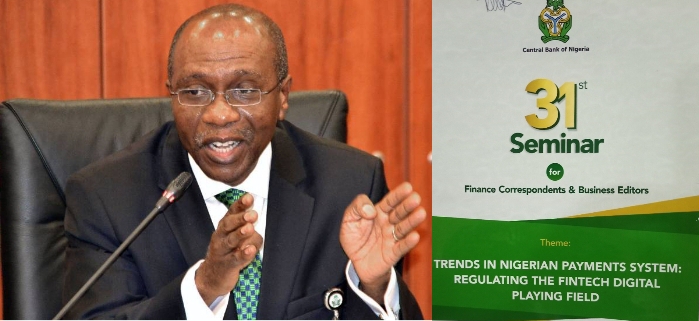FICAN Seminar Has Continued To Deepen Knowledge And Understanding Of CBN’s Policies- Emefiele
Oru Leonard
Ahead of the introduction of the Nigerian Digital currency, Governor of Central Bank of Nigeria (CBN), Mr Godwin Emefiele has said that the Financial Correspondents Association of NIgeria (FICAN), seminar has continued to deepen the knowledge and understanding of CBN’s policies and initiatives for Business Editors and Financial Correspondents.
The CBN Governor stated this while delivering his key note address today at the 31st Seminar for Finance Correspondents & Business Editors, holdig Enugu in Nigeria between October 5-7, 2021.
He noted that the forum has always availed the CBN and FICAN members, opportunity for balanced exchange of information and ideas between the Bank and the media.
He said the theme of this seminar: TRENDS IN NIGERIAN PAYMENTS SYSTEM: REGULATING THE FINTECH DIGITAL PLAYING FEILD apt in view of an increasingly evolving banking landscape characterized by acceleration in the digitalization of financial services which is facilitated by Fintechs, Open banking and emerging new technologies.
“In my remarks today, I would be focusing on the progress we have made so far in advancing the boundaries of payments system; the areas we are ensuring speedy progress and what we plan for the future of payments system in Nigeria, which shall soon be the hub of payments in Africa.
“As you are aware, the payments system of any country plays a pivotal role in its economy, being the channel through which financial resources flow from one segment of the economy to the other. This represents the major foundation of the modern market economy.
“In line with our mandate, as encapsulated in the Central Bank of Nigeria Act, 2007, the CBN regulates the Payments System, while banks, the Nigeria Inter-Bank Settlement System (NIBSS), the Nigerian Exchange Group, payment service providers and switching companies are the other major players in the system. The CBN, complemented by the Nigeria Deposit Insurance Corporation (NDIC) provides the necessary oversight function to ensure the efficiency and effectiveness of the payments system”, Emefiele noted.
He also said that the year 2007 marked a turning point in the country’s payments system terrain with the launch of the CBN’s Payment Systems Vision 2020 (PSV 2020), which identified series of recommendations to increase the resilience of the payment system infrastructure and work-streams to encourage the usage of electronic payment methods. Since then, the country has continued to introduce initiatives that would help simplify payments and deepen financial inclusion.
“Over the past 14 years, the Nigerian payment system has evolved significantly with extensive technological development backed by deliberate enabling regulation by the CBN. This has, no doubt, accelerated the development of novel financial products, services and channels all of which have placed Nigeria at the fore of the financial innovation race”, he
He noted that due to the lockdowns associated with the management of the Corona Virus (COVID-19) pandemic, financial traffic to digital platforms increased significantly in 2020. Indeed, the spread of the virus at the time accelerated the speed of digitalization of many sectors of the economy. Expectedly, discussions have increased around the issue of the digital economy just as more opportunities have come up for financial institutions and other players within the payment ecosystem to innovate and provide more efficient options for payments and settlements.
“From all indication, digital revolution will be a focus for Financial Institutions in the months ahead therefore making Fintechs a major driver of the industry. Technology continues to change the face of the financial services industry. The advent of digital financial services, for example, has created faster, more efficient, and typically cheaper transactions compared to traditional financial services. As the global economy recovers from COVID-19, it is obvious that FinTech will play a more important role towards resilient and sustainable recovery.
“Studies have already shown that only 1 percent of FinTechs have been critically affected by COVID-19 and 2 percent severely affected. By comparison, around 17 percent of other high-growth companies fall into these categories. It is therefore unsurprising that many FinTechs have experienced a surge in demand as working practices and customer banking habits changed. As a country with one of the largest millennial population in the world- (an estimated 62% of the Nigerian population below 25 years of age), fast Smartphone growth driven by increasing affordability, Increasing mobile penetration and fast transition to 5G technology, Nigeria remains primed to be an active playground for digital transformation and cannot afford to ignore the Fintech challenge.
“Furthermore, the pandemic tested the operational resilience and business continuity strategies of our banks. Operational risk increased due to the increased reliance on technology and third-party service providers during the period. Also, the risk of money laundering and cybercrimes have increased. There is also the elevated risk of unauthorized access to banks’ networks and data security breaches”, he butressed.
The CBN boss also noted that the International Monetary Fund (IMF) estimated the global economic cost of the COVID-19 pandemic at $28 trillion in lost output. In a bid to address the fallouts of the pandemic, authorities all over the world have implemented extraordinary policy measures to ease financial stability risks and we were not an exception.
He said in response to the crisis, the CBN introduced and implemented measures aimed at reducing the risk to financial stability, boosting demand and economic growth, ameliorating the impact of the pandemic on some sectors and obligors, such as the Oil & Gas, Manufacturing, Agriculture, pharmaceutical and hospitality sectors.
Key among the measures taken were the approval of regulatory forbearance to banks to restructure their loans to severely affected sectors; provision of liquidity support to banks; provision of the COVID19 Targeted Credit Facilities (TCF) disbursed to individuals and households through the NIRSAL Microfinance Bank, several CBN intervention funds targeted at the real sector, and the mobilization of the private sector to contribute to the National response under the CACOVID Initiative. Other complementary measures included actions to enhance the resilience of the banking industry to the threat of cyber risk and deployment of an industry wide Cybersecurity Fusion Centre (C2FC) and Malware Information Sharing Platform (MISP) to address the growing cyber risk by providing a unified interface for cybersecurity intelligence sharing and enhanced incident response capabilities .
With figures he further explaned that the measures have yielded the desired outcomes, as we begin to see the initial outline of an encouraging recovery given the recent data released by the National Bureau of Statistics with GDP growth put at 5% for the second quarter of 2021.
However, despite the issues associated with the pandemic, the banking industry has however, remained relatively resilient. This is attested to by our financial indicators with the industry Capital Adequacy Ratio (CAR) and Liquidity Ratio (LR) standing at 15.2% and 41.7%, respectively, at end-July 2021. These are above the prescribed prudential minimum. Also, the Non-Performing Loan Ratio, which was 5.4% as at the same period was above the regulatory maximum of 5% by only 40 bps. Notwithstanding these modest achievements, we cannot afford to rest on our oars as the work is far from over.
He robust payment system has continued to evolve towards meeting the needs of households and businesses in Nigeria. The high level of confidence in our payment system, between 2015 and 2020, has attracted the investment of about $500m in firms run by Nigerian founders.
In spite of these gains, about 36 percent of adult Nigerians still do not have access to financial services. Improving access to finance for individuals and businesses through digital channels can help to improve financial inclusion, lower the cost of transactions, and increase the flow of credit to businesses.




